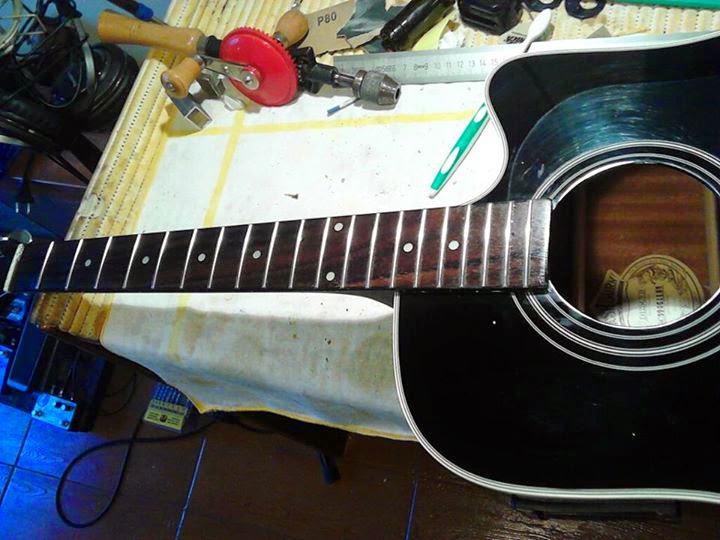In this post we will look at refretting an instrument when to do it and why, what you can expect from your new frets and some of the different options and how they affect playability and sound.
Frets wear out after some time. How long they last depends on what they are made of, your playing style, how hard you fret the notes and of course how many hours you spend playing.
Worn frets cause fret buzz and they can make the notes and chords sound unclear and even out of tune.
If your frets are high enough and not too worn you can level them, this consists of filing down every fret removing the dents and removing material from the least worn ones, that way all of them go back to being the same height. This can be a solution if the fret wear is very little, and if the frets are tall to begin with. With heavily worn frets or shorter ones I highly recommend a refret.
If your frets show little wear that doesn't affect the sound or your way of playing I usually recommend not changing them or doing a fret leveling job, just keep playing them until they wear out more.
Refrets are not a small easy job, it's always invasive and some woods handle it much better than others. Frets were not made to come off, taking them out if not done carefully will chip the wood it can also make the slots (were frets sit) enlarge thus making it much harder to put new frets in and make them stay in place.
Whenever a client comes in for a first time refret we talk for a while to decide what frets to put in, the choice can be a bit overwhelming at first. There are different materials, shapes, sizes. New frets can make or break a guitar so it's important that you are sure of what you want, so if someone isn't sure I always have guitars with different frets, playing always gives you a much better idea than size charts.
Jim Dunlop makes their accu frets out of german silver, it's a nickle copper alloy, that I tend to like a lot, they are durable, they have a crisp sharp attack.
Jescar uses several types of material from german silver to an alloy they call EVO Gold to stainless steel.
Jescars EVO are nickel free they were made with people that are allergic to nickel in mind, they are very durable, but unfortunately they don't have as many choices of sizes compared to Jim Dunlop.
A material that was been gaining importance especially in the world of custom builders is Stainless Steel or SS. Stainless Steel is very hard and dense. It's heavy, long lasting, and when working with it you need tough tools, some files will have a hard time scratching it let alone filling them down.
They have a very clear, loud sharp attack. Even tough they are hard to work with I really like them you can get them to be mirror smooth with the right tools.
These are the hardest and longer lasting alloys I have worked with. Of course they aren't the only options. I've seen frets made with zync and even lead alloys, these usually come in cheaper guitar and are very very soft, they look and sound dull.



No comments:
Post a Comment